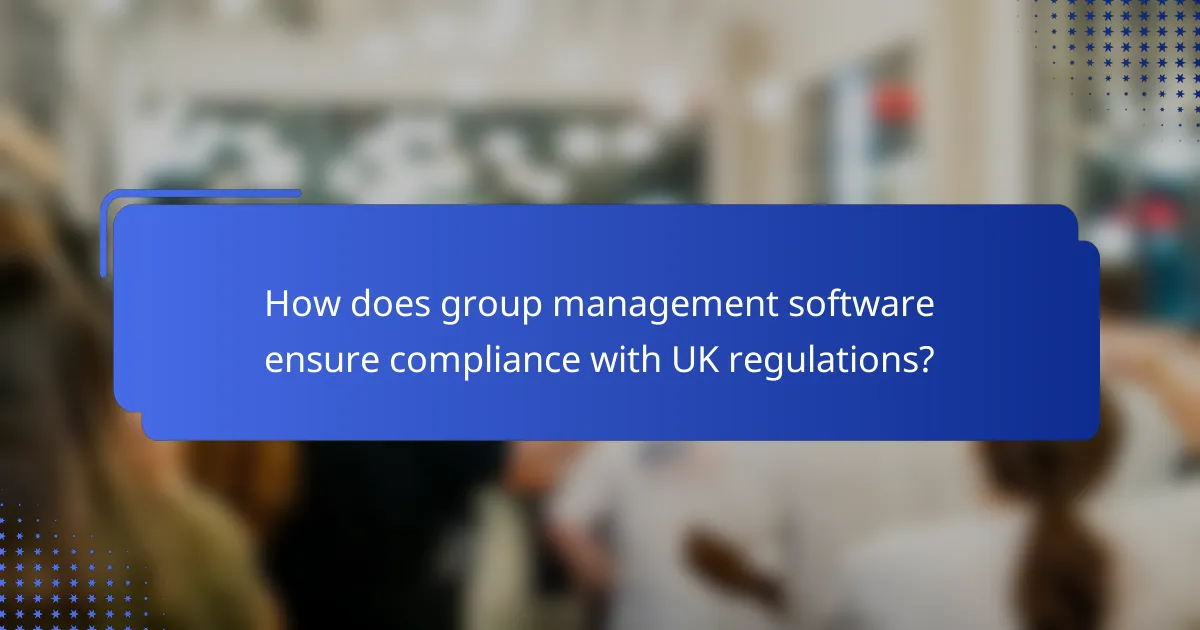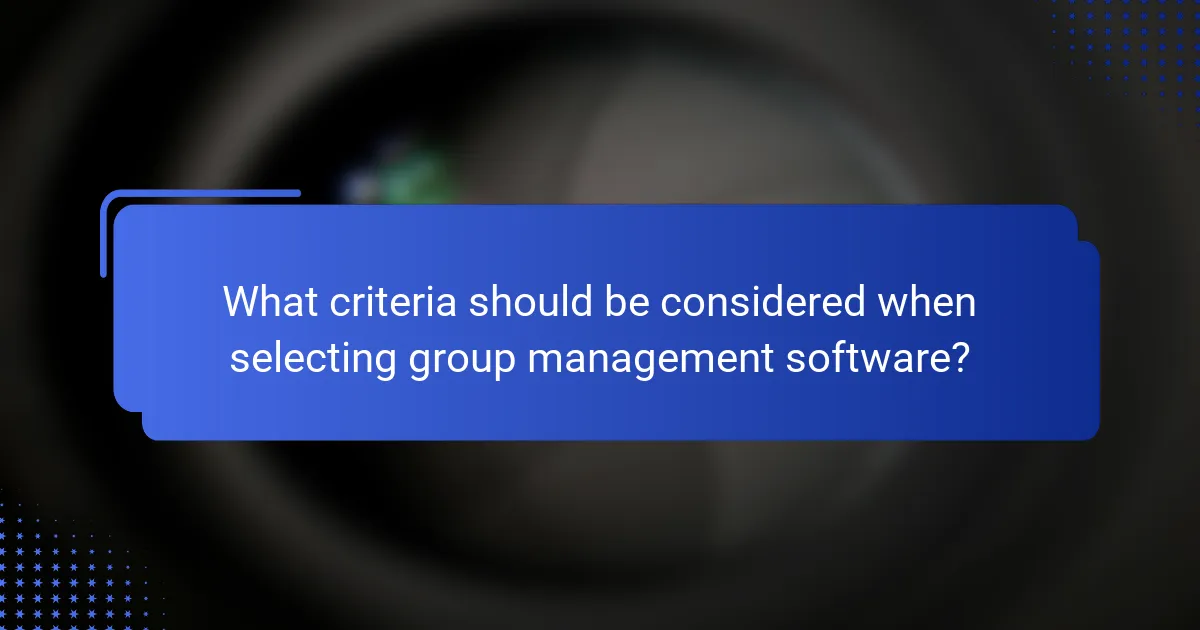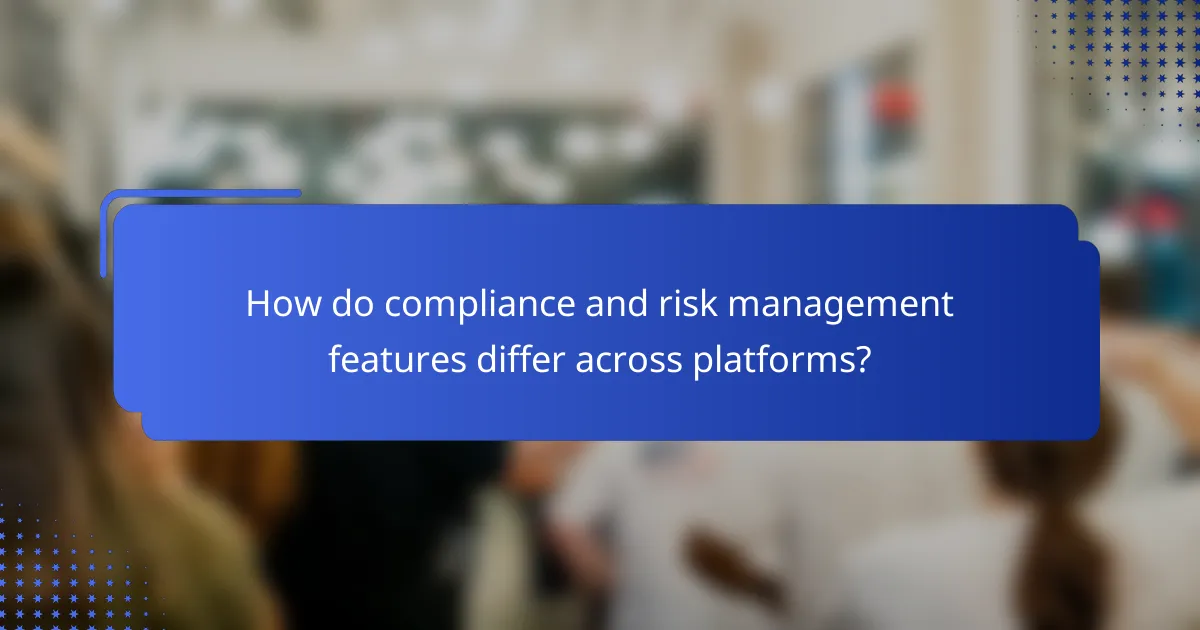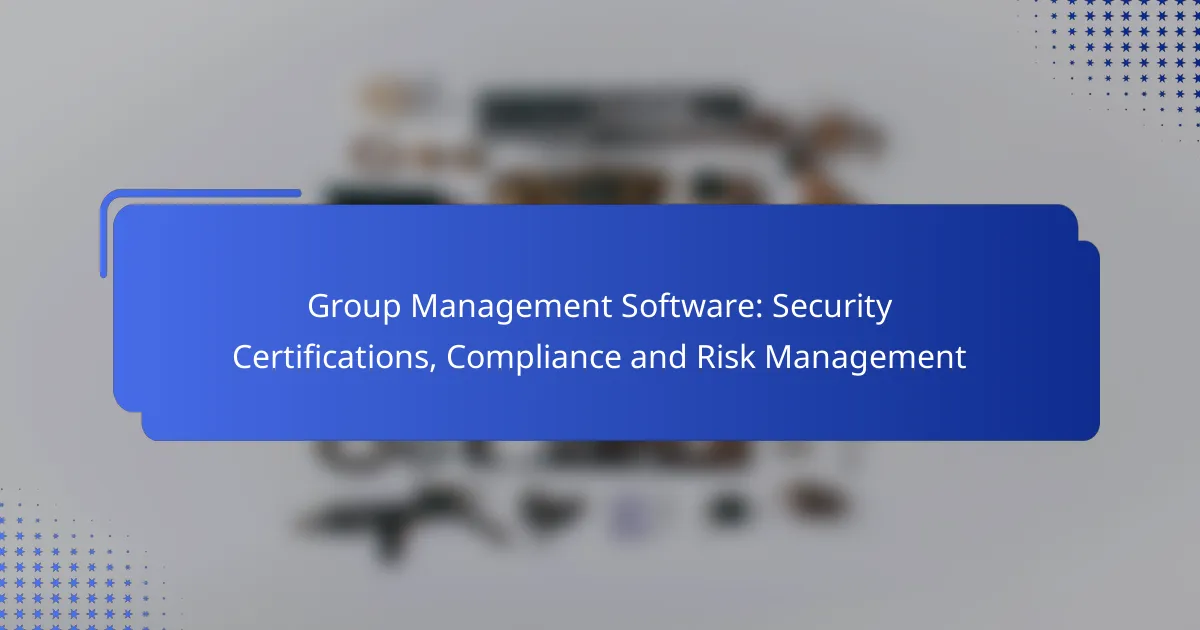Group management software plays a crucial role in enhancing security certifications, compliance, and risk management for organizations in the UK. By integrating robust security features and compliance tools, these solutions help businesses meet regulatory requirements and protect sensitive data effectively. Key certifications such as ISO 27001 and SOC 2 Type II further validate their commitment to maintaining high security standards.

What are the best group management software solutions for security certifications in the UK?
Several group management software solutions excel in security certifications within the UK, focusing on compliance and risk management. These tools help organizations meet regulatory requirements and enhance data protection through robust security features.
Microsoft 365 Compliance Center
Microsoft 365 Compliance Center provides a comprehensive suite of tools designed to help organizations manage compliance and security certifications effectively. It offers features such as data loss prevention, information governance, and compliance score tracking, which are essential for meeting UK regulations like GDPR.
Users can configure policies to protect sensitive information and monitor compliance across various Microsoft applications. The platform’s integration with other Microsoft services ensures a seamless experience for managing compliance efforts.
Asana for Compliance Management
Asana is a versatile project management tool that can be tailored for compliance management. It allows teams to create workflows that ensure adherence to security certifications by tracking tasks, deadlines, and responsibilities related to compliance initiatives.
With features like custom fields and project templates, Asana helps organizations maintain visibility over compliance processes. This can be particularly useful for managing audits and ensuring that all team members are aligned with compliance objectives.
Monday.com Security Features
Monday.com offers a user-friendly platform with strong security features that support compliance management. Its customizable boards allow teams to track compliance-related tasks and monitor progress towards achieving security certifications.
The platform includes automation options to streamline compliance workflows, reducing the risk of human error. Additionally, Monday.com provides integrations with various security tools, enhancing its capability to meet UK compliance standards effectively.

How does group management software ensure compliance with UK regulations?
Group management software helps organizations comply with UK regulations by providing tools and features that align with legal requirements, particularly in data protection and security. These solutions often include built-in compliance checks, reporting capabilities, and user access controls to mitigate risks and ensure adherence to laws.
GDPR Compliance Tools
GDPR compliance tools within group management software assist organizations in managing personal data according to the General Data Protection Regulation. These tools typically include data mapping features, consent management systems, and audit trails to track data processing activities.
To effectively utilize these tools, organizations should regularly review their data handling practices and ensure that all team members are trained on GDPR requirements. Implementing automated alerts for data breaches can also enhance compliance efforts.
ISO 27001 Certification Support
ISO 27001 certification support in group management software helps organizations establish, implement, and maintain an information security management system (ISMS). This support often includes risk assessment tools, policy templates, and documentation management features that streamline the certification process.
Organizations aiming for ISO 27001 certification should conduct regular internal audits and risk assessments to identify vulnerabilities. Additionally, engaging with a certified consultant can provide valuable insights and guidance throughout the certification journey.

What are the key security certifications for group management software?
Key security certifications for group management software include ISO 27001 and SOC 2 Type II. These certifications help organizations demonstrate their commitment to security, compliance, and risk management, ensuring that they meet industry standards and protect sensitive data effectively.
ISO 27001
ISO 27001 is an international standard that outlines the requirements for an information security management system (ISMS). Organizations seeking this certification must establish, implement, maintain, and continually improve their ISMS to manage sensitive information securely.
To achieve ISO 27001 certification, companies should conduct a thorough risk assessment, identify potential vulnerabilities, and implement appropriate security controls. Regular audits and reviews are essential to ensure ongoing compliance and to adapt to changing security threats.
SOC 2 Type II
SOC 2 Type II is a certification that evaluates the effectiveness of an organization’s controls related to security, availability, processing integrity, confidentiality, and privacy over a specified period. This certification is particularly relevant for service providers that handle customer data.
To obtain SOC 2 Type II certification, organizations must undergo an extensive audit by an independent third party, which assesses their operational effectiveness over time. Maintaining this certification requires continuous monitoring and improvement of security practices to address emerging risks and ensure compliance with customer expectations.

How can group management software mitigate risks in team collaboration?
Group management software can significantly reduce risks in team collaboration by implementing robust security measures and compliance protocols. These tools enhance data protection, streamline user access, and ensure that sensitive information remains secure during collaborative efforts.
Data Encryption Features
Data encryption features protect sensitive information by converting it into a secure format that is unreadable without the appropriate decryption key. This ensures that even if data is intercepted during transmission, it remains inaccessible to unauthorized users.
When selecting group management software, look for options that offer end-to-end encryption, especially for data stored in the cloud. This means that data is encrypted on the sender’s device and only decrypted on the recipient’s device, minimizing exposure during transfer.
User Access Controls
User access controls are essential for managing who can view or edit information within group management software. By setting permissions based on roles, organizations can limit access to sensitive data, reducing the risk of accidental or malicious data breaches.
Implement role-based access controls (RBAC) to ensure that team members only have access to the information necessary for their tasks. Regularly review and update these permissions to reflect changes in team structure or project requirements, which helps maintain security over time.

What criteria should be considered when selecting group management software?
When selecting group management software, consider integration capabilities, scalability options, security certifications, and compliance with relevant regulations. These criteria ensure the software meets your organization’s needs and can adapt as those needs evolve.
Integration Capabilities
Integration capabilities refer to how well the software connects with other tools and systems your organization uses. Look for software that supports popular APIs and can easily integrate with existing platforms like CRM systems, communication tools, and project management applications.
Assess whether the software offers pre-built integrations or requires custom development. Pre-built options can save time and resources, while custom solutions may provide more flexibility but can be costly and time-consuming.
Scalability Options
Scalability options determine how well the software can grow with your organization. Choose software that can handle an increasing number of users and data without sacrificing performance. This is particularly important for organizations anticipating growth or seasonal fluctuations in usage.
Evaluate whether the software can be upgraded easily, whether through additional features or increased user licenses. A scalable solution should allow you to adjust your plan as your needs change, ensuring you only pay for what you use.

How do compliance and risk management features differ across platforms?
Compliance and risk management features vary significantly across group management software platforms, impacting how organizations meet regulatory requirements and mitigate risks. Key differences include the range of compliance standards supported, the depth of risk assessment tools, and the integration capabilities with existing systems.
Comparative Analysis of Features
When comparing compliance and risk management features, consider the specific regulations each platform addresses, such as GDPR, HIPAA, or PCI-DSS. Some platforms may offer comprehensive compliance tracking, while others focus on risk assessment tools that help identify vulnerabilities. Additionally, the ability to generate reports and audit trails can vary, influencing how easily organizations can demonstrate compliance.
For example, a platform that integrates seamlessly with existing IT infrastructure may provide a more streamlined compliance process, whereas one that requires extensive manual input could lead to errors and inefficiencies. Look for features like automated alerts for compliance deadlines and risk assessment scoring systems to enhance your decision-making.
User Reviews and Ratings
User reviews often highlight the effectiveness of compliance and risk management features in real-world applications. Many users appreciate platforms that offer user-friendly interfaces and robust support for compliance documentation. Ratings can provide insight into how well a platform performs in practice, particularly regarding ease of use and the reliability of risk assessments.

What are the emerging trends in group management software security?
Emerging trends in group management software security focus on advanced technologies and user-centric features that enhance risk management and data protection. These trends aim to address growing security concerns and regulatory requirements while improving overall user experience.
AI-Driven Risk Assessment
AI-driven risk assessment tools leverage machine learning algorithms to identify potential vulnerabilities and threats in real-time. By analyzing patterns in user behavior and system interactions, these tools can predict risks and suggest preventive measures, making them essential for proactive security management.
Organizations should consider integrating AI risk assessment tools that can adapt to their specific environments. For instance, a software solution might analyze user access patterns to flag unusual activities, allowing administrators to respond swiftly to potential breaches.
Enhanced User Privacy Features
Enhanced user privacy features are becoming critical as data protection regulations tighten globally. These features often include advanced encryption methods, user consent management, and data anonymization techniques, ensuring that personal information is safeguarded against unauthorized access.
To implement effective privacy measures, organizations should prioritize solutions that offer customizable privacy settings. For example, allowing users to control their data sharing preferences can significantly enhance trust and compliance with regulations like GDPR or CCPA.
